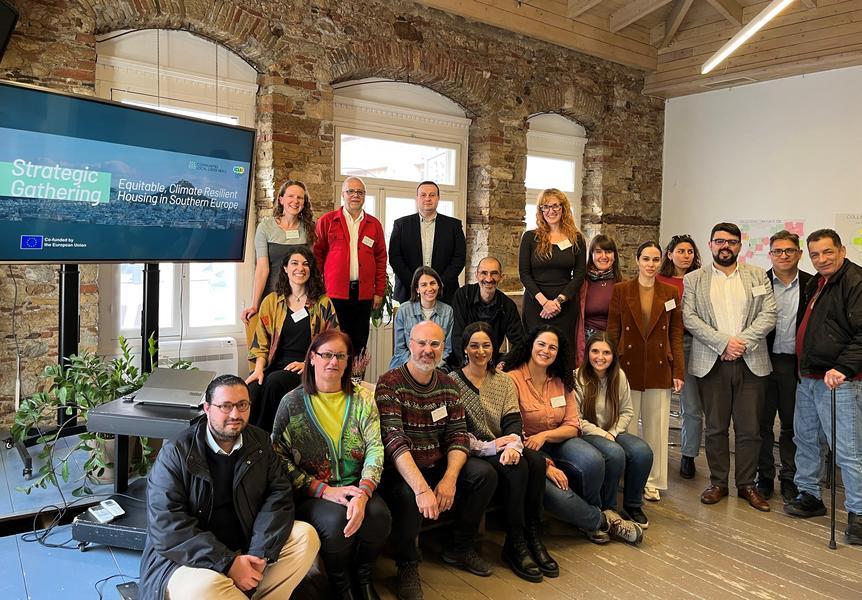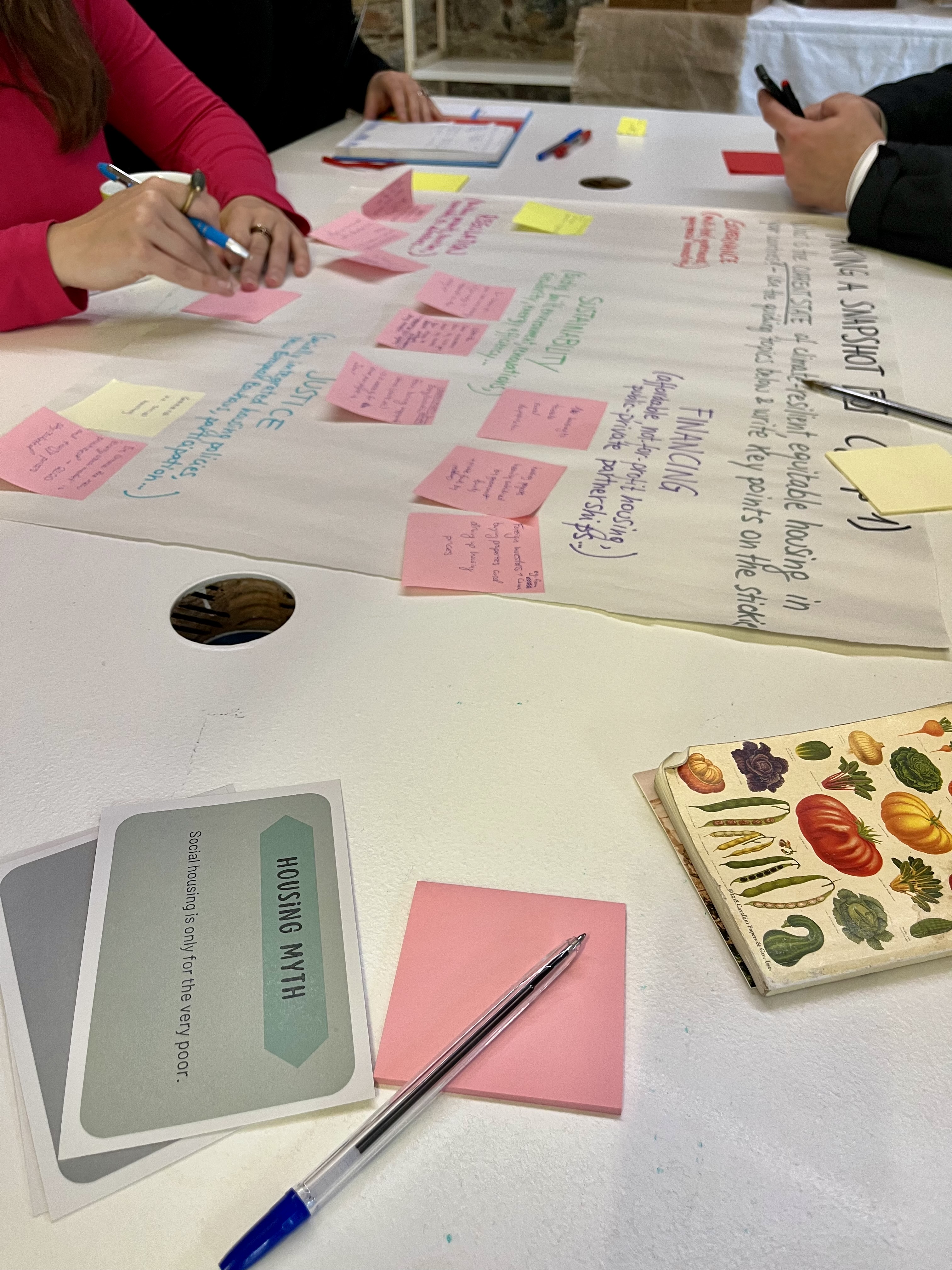
Vacant homes, renovictions, and golden visas: Exploring equitable, climate-resilient housing in Southern Europe
A moment to seize
As Southern Europe contends with wildfires, heat, water scarcity and floods, climate resilience measures are increasingly non-negotiable. People who are already challenged to meet basic needs such as adequate and affordable housing are more vulnerable. In cities, it is long-since known that this group is growing. The unfortunate combination of aging housing stock in need of retrofitting, short supply of affordable housing, and growing burden of energy poverty is becoming a more common story. Therefore, measures towards climate- resilient and affordable housing are a prudent way to enhance climate mitigation, adaptation, and social support. The EU does not yet have a clear outlook for climate-resilient housing based on this holistic approach, but there are several new entry points: the European Green Deal’s Energy Performance of Buildings Directive is underway, and for the first time, a Commissioner has housing in their portfolio and an EU affordable housing strategy is being developed.
Recognising this timely moment, ICLEI Europe hosted a Strategic Gathering on Equitable, Climate-resilient Housing in Southern Europe from April 9th-11th in Athens, Greece through the Communities for Local Green Deals project. Over these days, local governments, researchers, community initiatives and other organisations working at the intersection of climate resilience, justice and housing in Southern Europe explored shared frustrations and optimism together.
The event
Participants made new, and occasionally unexpected personal connections, explored the EU housing policy landscape and shared insights from their local contexts through discussions structured around five key themes: Governance, Regulation, Financing, Justice, and Sustainability. These conversations helped build a collective understanding of housing realities across Southern Europe.
They used persona cards to step into other people’s shoes and empathise with diverse housing challenges, and engaged with practical case studies. Dr. Dimitra Siatitsa presented research on alternative housing policies and the repurposing of vacant buildings in Athens and Thessaloniki, while Katerina-Shelagh Boucoyannis of CoHab Athens highlighted a recent design competition focused on inclusive, sustainable housing. Stefania Gyftopolou from the EUI project Rock the Block shared how participatory processes are driving community-led renovations in Athens. Inspired by these examples, participants held “less of / more of” discussions to identify harmful and effective practices across sectors, and mapped out collective advocacy opportunities for the coming year.
A visit to the Athens Municipality Energy Poverty Office gave an up-close look into how the city is approaching energy poverty by waiving municipal energy taxes for low-income households. Led by Eleni Kanellou of the National Technical University of Athens, the visit offered a tangible example of local innovation in climate-resilient housing.
.jpg)

What we’re taking away
- Housing is an important policy field where justice and climate-resilience intersect. It is a high priority at the EU level, as demonstrated by the upcoming EU Affordable housing strategy, which must also consider climate-resilience if it is to address multiple intersecting issues faced by people in Southern Europe.
- There were many shared challenges around sustainability and justice in housing amongst the countries represented. Energy poverty, for instance, is a shared challenge by all countries, along with ‘renovictions’ aka energy efficiency renovations resulting in evictions due to increased costs to tenants. Golden visas (residence permits for foreign real estate investors) along with tourist accommodation, are seen as a cause of housing inaffordability across Southern Europe. Some energy communities connected with co-housing (Greece) and strong tenant unions (Spain) are seen as current good practices. Housing practices in the Ukraine stood out, since the country is dedicated to building social housing and ensuring that new-builds are solar-powered instead of gas to increase independence and thus resilience. Meanwhile, in Greece there is no government-led social housing and Portugal’s social housing system is struggling to take off. Overall, there is still a lack of holistic equitable, climate-resilient housing examples in Southern Europe.
- Adopting methods like persona cards pushes people to think empathetically and connect better with others. This exercise revealed the diversity of needs and wishes for housing based on personal identity.
- Case study examples highlight the current state of affordable and climate-resilient housing in Greece. Challenges include: A program by program approach that is not integrated or systemic, a privatised market-oriented approach, and no quality control on how public incentives are used and who gets them (e.g. retrofitting). The presenters made a case for: A stronger municipal role, alliances between different bodies and collective learning processes, and a vision of sustainable housing for all.
- For equitable, climate-resilient housing in Southern Europe, we need less bureaucracy and corruption from the public sector, less fragmentation from the third sector, and less financialisation, lobbying and money laundering by the private sector. Meanwhile, we need more political will to change from the public sector, more involvement in housing planning and development from the third sector, and more decommodified housing and ethical banking options from the private sector.
- There are more international events on housing than ever, and there is a will to collaborate on certain ICLEI-led events to bring messages from this Southern Europe Gathering to the European level.

Final reflections
The event marks an important step toward a more just and climate-adaptive housing future in Southern Europe. Participants felt that meetings such as this one are very important because they gather different actors like civil society and local governments that would otherwise not exchange. The gathering offered a chance to connect, learn from each other, and do joint advocacy for shared interests. There was certainly a sense of pessimism in acknowledging that deep systemic change is needed to address the equitable, climate-resilient housing issue, and civil society feels somewhat powerless compared to the public and private sector. However, by providing good housing for its citizens despite a war, Vinnytsia’s Municipal Services Department Director explained that Ukraine shows how a society can develop strong internal cohesion and solidarity and pull together to solve housing problems. In general, participants also believe that, despite a deeply unequal and unsustainable state of housing in Southern Europe, hope dies last. Local level initiatives need to show that the solutions they propose can work, thus making their local governments proud and consequently boosting political will at multiple levels. Political will is the most valuable asset, even more so than money. This Gathering is the beginning of more collaborative efforts to come.
